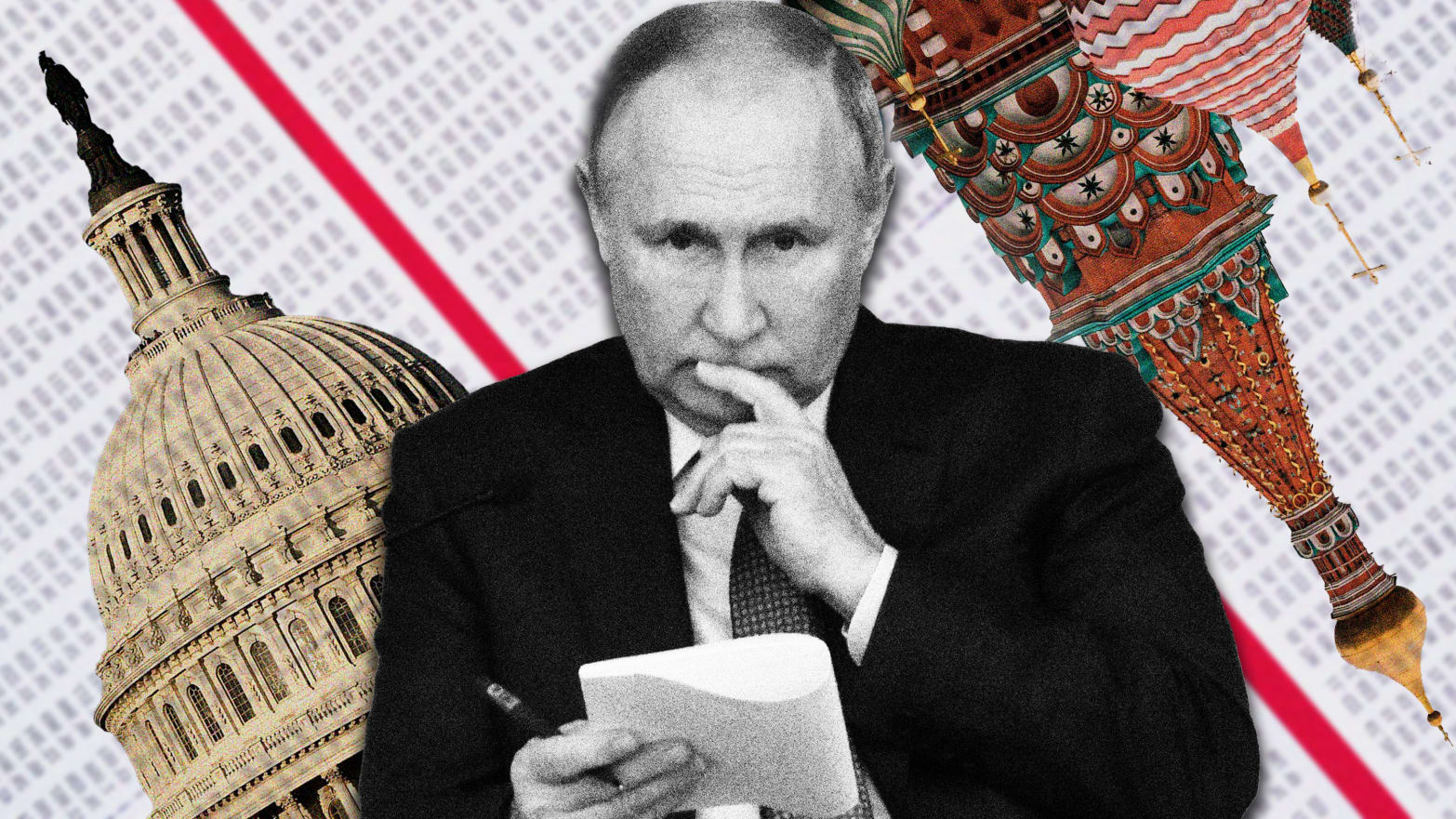MOSCOW—It’s easy to see why President Vladimir Putin might have thought ratcheting up tensions on Ukraine’s border and blaming it all on NATO and the U.S. would rally his faltering support back home, but this time something different is happening.
Most Russians aren’t buying it.
Domestic propaganda levels have reached near-hysteria this year after anti-Putin protests swept the country following the attempted murder and imprisonment of opposition leader Alexei Navalny.
The drumbeat of war against Ukraine is becoming louder by the week and Putin has made ever wilder demands of NATO, which was the primary focus of his talking points in the video conference summit with President Biden earlier this month. He must surely know those demands can never be met.
If you follow the local—state-owned—TV stations in Russia, you are constantly warned that a new war is on the horizon; that Russia will bravely stand up to the West; and that America is the real enemy.
That message is increasingly falling on deaf ears.
A study published this week by the Levada Analytical Center showed that for the first time in years more Russians think positively than negatively about the U.S.—by 45 percent to 42 percent.
When Levada asked the same question in May, only 31 percent said the U.S. was “good” vs. 54 percent “bad.”
In those intervening months, Moscow has accused Washington of “fueling tension” over Ukraine, gas pipelines, Navalny, and hacking. Tit-for-tat diplomatic spats have led to the U.S. embassy cutting 75 percent of staff in Moscow and no longer processing visas, meaning Russians wanting U.S. travel visas and green cards now have to apply in Warsaw. An agreement is in the works to fix that particular stand-off, but it shows the real world impact of diplomatic wrangling on ordinary people.
“Politicians and ordinary people often have different agendas,” said Susanna Emirali, a young advertising producer. “Most of my friends understand that ordinary Americans are cool.”
Emirali is typical of the Russians who are now rejecting state propaganda. She says she avoids watching political talk shows on television and prefers to read her news on independent outlets online. She believes the United States has nothing to do with Russia’s biggest problems and hopes the conflict between Moscow and Washington will soon end.
While Moscow and Washington are at loggerheads over “red lines” and security guarantees, ordinary Russians are growing tired of the aggressive anti-Western propaganda thrown at them from their TV sets every night. This flies in the face of years of assumptions that Putin can turn up the dial on anti-Americanism feeling among Russians at will.
During the pandemic last year Emirali said she saw her mother and father’s eyes begin to open. Both engineers in their late forties, they stopped watching television and began to read news on independent sites, learning first about the poisoning attack on Navalny, then about his arrest and about the mass opposition protests in both Russia and Belarus.
“They began to sympathize with arrested peaceful protesters, so their political views have changed, they openly blame Putin for domestic problems,” Emirali said.
The author of Levada’s report, Lev Gudkov, said there had been a fundamental shift in Russia. “We see increasingly deep public disillusionment in Putin’s leadership: incomes have decreased by 13 percent since 2010 and during the pandemic many more people lost jobs and grew poorer; there are nearly twice as many cases of political persecutions,” he said. “It is important to understand that Russians now have much less tolerance for anti-American propaganda, it makes people angry during the pandemic to see that the state spends more money on buying arms and preparing for wars than on new hospitals, district clinics—our medical service is in poor condition.”
Gudkov says a majority of Russians believe that it is Putin who is responsible for their woes. “Russians realize that it is not the United States that is responsible for domestic problems. As for the international issues, people are worried about the war—an absolute majority of our respondents, 75 percent, say that the military tensions on the border with Ukraine might blow up into a war between Russia and Ukraine,” he told The Daily Beast.
The winner of this year’s Nobel Peace Prize, Russian journalist Dmitry Muratov, used the ceremony this week to invoke the words of another former Peace Prize winner, ex-president Mikhail Gorbachev. He once told ministers that were agitating for further military adventure to “stop your hawk squawk.”
Muratov repeated that demand, and called for journalists and politicians to “stop the hawk squawk” now.
Ordinary Russians dream of an end to the Cold War rhetoric and for the authorities to stop painting Washington as public enemy No. 1.
And yet, when The Daily Beast approached a pro-Kremlin analyst with questions about Russia’s tensions with the West and Ukraine, we were told it was all the fault of the U.S.
“Americans should understand the word ‘undo’ and restore the situation we had in Ukraine back in 2013 when it was in Russia’s sphere of influence,” Dmitry Drobniysky said.
On television, the propagandists continue to spin. After the Putin-Biden talks, one of the Kremlin’s key supporters Dmitry Kisilyov told viewers that Americans were beginning to realize that Russia is now the dominant force: “Ever since the 1990s America behaved as though it was the winner in the Cold War but their feeling of superiority has been melting as the decades passed and after the two-hour long Putin-Biden conversation there was nothing left of it.”
In reality, many people are now questioning the propaganda. Olga Alekseyeva, a retired doctor from Saint Petersburg, said she has been following the viral reports of inhumane practices, including torture, in Russian prisons where political dissidents like Navalny are confined.
She is one of nine million people who viewed an explosive recent Yuriy Dud documentary on YouTube. “People analyze the outrageously unfair court system, lawlessness in security services here, so I am not surprised more Russians like the West,” Alekseyeva told The Daily Beast. “My friends in San Francisco tell me how hard and expensive life is in the U.S. but I am personally thankful that the U.S. tries to help Russia. Maybe they have no genuine sympathy for our political prisoners, it’s just a political agenda, but at least they talk with Putin and he listens to them—that is wonderful. As sometimes, I think, maybe Putin is totally isolated.”
Many young Russians pay little attention to political news. Karen Shainyan films young Russians for his journalistic “Queerography” project on YouTube.
So far, he has filmed life stories of LGBTQ people in eight Russian regions, including Yakutia in the far north, Vladivostok in the east, Sochi on the Black Sea and Tatarstan on the Volga river. “We interviewed 10 people in Kazan, three of them were IT experts planning to move to the United States. There is a lot of respect for the West in our community, to countries like United States where queer people have rights.”
Putin is facing a slow moving generational issue, with young people striving for independence, but the coronavirus has also accelerated his problems.
There have been over 800,000 excess deaths in Russia since the pandemic began. Crowds of voters appealed to Russian politicians, complaining about poor medical service, tiny salaries, miserable pensions, and unemployment during recent parliamentary and local elections. “I have spoken with dozens of Russians unhappy about their lives who blame the government but I have not met anybody in Saint Petersburg who would blame the U.S. for their domestic troubles,” opposition deputy Boris Vishnevsky told The Daily Beast. “It does not surprise me that the propaganda does not work.”

